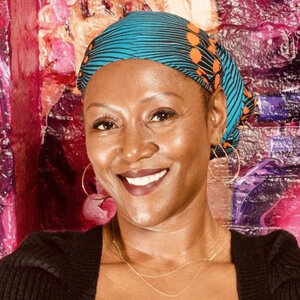Monique Couvson, President and CEO, Grantmakers for Girls of Color
October 28, 2022
Dr. Monique Couvson (formerly Monique W. Morris) is an award-winning author and social justice scholar with three decades of experience in the areas of education, civil rights, juvenile, and criminal justice. Her research intersects race, gender, education, and justice to explore the ways in which Black communities, and other communities of color are affected by social policies.
Before becoming the inaugural president and CEO of Grantmakers for Girls of Color (G4GC), Couvson co-founded the National Black Women's Justice Institute, which works to reduce racial and gender disparities across the justice continuum. She is the author of Sing a Rhythm, Dance a Blues: Education for the Liberation of Black and Brown Girls and Pushout: The Criminalization of Black Girls in Schools, which was released as a documentary in 2019, and her most recent book is Cultivating Joyful Learning Spaces for Black Girls: Insights into Interrupting School Pushout (ASCD, 2022). Her 2018 TED talk, “Why Black girls are targeted for punishment at school— and how to change that" has been translated into 18 languages and viewed nearly two million times. She has worked in partnership with and served as a consultant for federal, state and county agencies, national academic and research institutions, and communities throughout the nation to develop research, comprehensive approaches, and training curricula to eliminate racial/ethnic and gender disparities in justice and educational systems.
PND spoke with Couvson about the goals of the Future Economy Lab initiative; the obstacles that constrain giving for Black girls, femmes, and gender-expansive youth of color; the strategies that would increase giving; how Black philanthropy plays a part; and how Black girls and women can become more centered in conversations that discuss their unmet needs and barriers to success.
Philanthropy News Digest: What is the goal of the Future Economy Lab, a partnership between Grantmakers for Girls of Color (G4GC) and SecondMuse Capital, and how will it impact Black girls, femmes, and gender-expansive youth of color?
Monique Couvson: Through the Future Economy Lab: Abundantly Investing in Girls, Femmes, and Gender-expansive Youth of Color, we aim to actively engage Black girls and other girls, femmes, and gender-expansive youth of color in the co-construction of strategies to achieve economic equity.
Young people who have historically been excluded from opportunities for economic advancement now get to shape them. This project is about shifting the narrative so that Black and other girls, femmes, and gender-expansive youth of color are seen as critical stakeholders in conversations about finance, investment, and economic power. Through co-creating and designing financial tools to advance racial and gender equity, young people will create new strategies for the economic wellness of our richly diverse Black communities.
This project is about shifting the narrative so that Black and other girls, femmes, and gender-expansive youth of color are seen as critical stakeholders in conversations about finance, investment, and economic power.
Ultimately, through the new financial mechanisms that these young people will help build alongside other stakeholders, we can help usher in new opportunities for their peers and others in their communities to grow their own business enterprises; contribute to the financial sustainability of innovative ecosystems that support girls, femmes, and gender-expansive youth of color; support the pipeline of new economic projects that place wealth and capital back into communities, and attract increased and more diverse investments.
PND: What is the biggest obstacle that constrains giving for Black girls, femmes, and gender-expansive youth of color? What strategies would increase giving for causes that you champion through G4GC?
MC: Black girls and other girls, femmes, and gender-expansive youth of color are innovative, powerful, and brilliant, and they have a right to live full, healthy lives. Our ultimate goal is to build a world where every young person of color is free to live, dream, and achieve in their own unique way. Standing in their way are multiple forms of structural violence due to their gender, age, and race or ethnicity. We know that philanthropic support for women and girls, in general, has historically been paltry at best. When you then layer in the effects of anti-Blackness, Black girls have experienced erasure, adultification, and underinvestment.
That’s one of the reasons that I joined a group of Black women leaders and advocates in 2020 to launch the #1Billion4BlackGirls campaign, to mobilize for a $1 billion investment in Black girls, femmes, and gender-expansive youth over the next decade. This campaign was launched to address the extreme dearth of philanthropic investments in Black girls. As part of that campaign, we at G4GC launched the Black Girl Freedom Fund to resource the brain trust, innovation, safety, and joy of Black girls, femmes, gender-expansive youth, and their families. Since then, we've been committed to mobilizing others to recognize the power we all experience when we robustly resource and celebrate Black girls, femmes, and gender-expansive youth, while we engage young people themselves to guide, advise, and determine how these investments should be allocated.
There are more than enough resources available in the U.S. to create a more just, equitable world for Black girls and other girls, femmes, and gender-expansive youth of color. In partnership with them, we must reimagine the way these resources are shared and distributed. Philanthropy can commit to abundantly resourcing girls, femmes, and gender-expansive youth of color and engaging them and their ideas so they can design their own liberated futures.
PND: Has Black philanthropy played a part in giving for Black girls and women? To what extent?
MC: At G4GC, our mission builds on the wisdom and experiences of our ancestors. Black philanthropy—past and present—underpins our current giving. Despite the racial wealth gap, Black households give away 25 percent more of their income per year on average compared to white households. Almost two-thirds of Black households donate to organizations and causes, totaling around $11 billion every year.
We at G4GC engage in a philanthropic practice that builds on the rich tradition of ancestral legacies of “giving” that honors the diverse ways that our communities take care of and resource one another. We center the practice of love and care in our philanthropy, which shows up in our daily work through a lens of reciprocity, intersectionality, and cultural responsiveness.
The Black Girl Freedom Fund and the #1Billion4BlackGirls campaign reflect that spirit of reciprocity. In 2020, Grammy award-winning artist Ciara wrote a song called “Rooted” as an ode to Black girls. She became the first donor to the Black Girl Freedom Fund when she donated proceeds from this song, and she has been joined by hundreds of Black women and girls who have donated their financial resources, their platforms, and their time to this effort.
PND: How can Black girls and women become more centered in conversations about their unmet needs and barriers to success?
MC: As philanthropists, we have an important role to play in centering Black girls, femmes, gender-expansive youth, and women.
At Grantmakers for Girls of Color, we are not just giving resources; we are also ceding power. Through our youth engagement model, our youth advisors influence our programs and communications to our grantmaking and are also final decision makers on many of our grants. We practice a shared leadership model where we learn alongside young people, affirm that they are the experts in their lives, and share decision-making power. Through their leadership roles, these young people develop critical skills in research, grantmaking, and participatory storytelling.
At Grantmakers for Girls of Color, we are not just giving resources; we are also ceding power....We practice a shared leadership model where we learn alongside young people, affirm that they are the experts in their lives, and share decision-making power.
Providing funding and activating our shared expertise and influence decentralizes power and demonstrates our values, which allows us to fight racism, sexism, ageism, and other systemic injustices, and create the conditions necessary for femme-identified youth of color to thrive.
How can we tap into the deep wisdom of Black girls, femmes, and gender-expansive youth and not perpetuate white supremacy, knowing all of the systems in our country and society—legal, education, health care, and politics, among others—are girded by it? How can we build the trust and confidence necessary with the very people who have been most negatively affected by it to do this work authentically?
Trust and respect Black girls, femmes, and gender-expansive youth. Center their leadership and abundantly resource them. When we get out of their way, we all thrive.
—Lauren Brathwaite
For an in-depth look at trends in Black philanthropy, see PND’s “Black philanthropy: Overcoming the wealth gap to build on a legacy of giving.”







